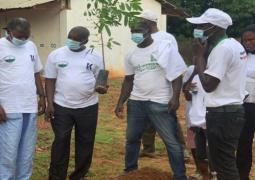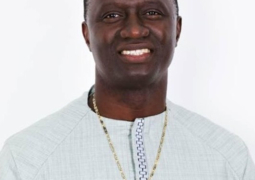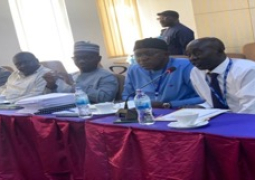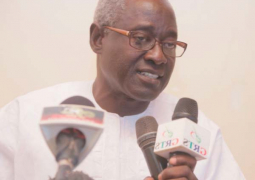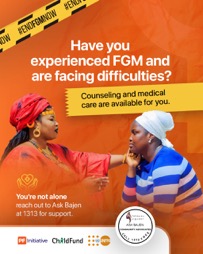
The foundation was established in 2020 with the desire to empower women and girls as well as survivors of sexual and gender base violence including the deeply rooted cultural and traditional practice FGM/ C.
‘Ask Bajen’ is an influential women-led advocacy group and a Community Advocate, a dynamic initiative created by the (PF)-Initiative, formerly (Paradise Foundation), which aims to address the deep-rooted issues of Sexual and Gender Based Violence.
Aisha Baldeh, Executive Director of PF Initiative, highlighted the advocacy programs of Paradise Foundation on Female Genital mutilation/ cutting ( FGM/C) and other issues, saying they have garnered significant recognition and authority, particularly as the pioneering organisation behind the establishment and operation of the national SGBV Helpline ‘1313’.
“Additionally in their advocacy programs, Paradise Foundation runs SGBV awareness programs in schools and communities to raise awareness about the dangers of SGBV including FGM/C and the rights of girls and women,” she said, adding that they also offer medical and psychological support services to women who have experienced FGM and are facing physical or emotional problems.
She explained that at the core of their strategy is a community-centric approach, which the Ask Bajen program exemplifies with a network of female advocates deeply embedded within local communities. This she said, fosters trust and ensures culturally sensitive outreach, making their efforts to address issues like FGM/C both meaningful and effective.
Tailoring their communication to be culturally appropriate, Mrs Baldeh stated that their educational materials and awareness campaigns resonate deeply with target audiences.
She reflects that the sensitivity to local contexts enhances the effectiveness of their outreach, ensuring that their messages are well-received and impactful and the strong ties they have built within communities foster trust and open communication, facilitating more effective interventions.
Sequel to the appeal made by some scholars to lift the ban on FGM/C, she advises to continue seeking support from healthcare professionals, counselors, or CALL ‘1313’ free. She also encourages women and girls to learn about their rights and available legal options.
In their concerted efforts to help survivors of FGM/C encountering difficulties, Paradise Foundation SGBV Helpline offers various support services such as referral for Medical Care through which they connect survivors with medical professionals who can address health complications arising from FGM/C and also counseling services, or refer to the one-stop centres to help survivors cope with the emotional trauma of FGM/C.
Madam Baldeh highlighted the implications of FGM, saying it has severe consequences, including physical health problems: pain, bleeding, infections, scarring, difficulty passing urine or menstrual cramps, psychological trauma, anxiety, depression, PTSD, and difficulty in sexual relationships.
Additionally, she noted, it increased risk of complications during childbirth and future surgeries.
In educating girls on their right to decide what happens to their body, Paradise Foundation is planning a campaign to educate girls on bodily anatomy. This includes interactive sessions to address bodily rights and the dangers of FGM/C and creating and distributing booklets, posters, or infographics on the topic.
Paradise Foundation is also collaborating with other CSOs and government mainly the Ministry of Gender, Children and Social Welfare and the Gambia Police Force in advocating for the implementation of stricter laws against SGBV including FGM/C.


